
Topics
Guests
- Mathilde VuSudan advocacy manager at the Norwegian Refugee Council.
- Nathaniel Raymondexecutive director of the Humanitarian Research Lab at the Yale School of Public Health.
Sudan’s military is accusing the paramilitary Rapid Support Forces of killing at least 2,000 people since seizing control of El Fasher in the Darfur region, including some 460 at the Saudi Maternity Hospital. Meanwhile, tens of thousands have fled.
“What’s happening is no less than a … campaign of destruction and annihilation,” says Mathilde Vu, Sudan advocacy manager at the Norwegian Refugee Council, speaking to Democracy Now! from Kenya.
What’s unfolding in El Fasher is “the sum of all our fears,” adds Nathaniel Raymond, executive director of the Humanitarian Research Lab at the Yale School of Public Health. He urges the United States to put pressure on the United Arab Emirates, which has backed the RSF in the civil war as the group carries out “acts that are tantamount to genocide.”
Transcript
AMY GOODMAN: This is Democracy Now!, democracynow.org. I’m Amy Goodman, with Nermeen Shaikh.
NERMEEN SHAIKH: Sudan’s government says the Rapid Support Forces paramilitary group has killed at least 2,000 people in the three days since it seized control of the city of El Fasher in the Darfur region. The World Health Organization has condemned the reported killing of 460 patients and their companions at the Saudi Maternity Hospital in El Fasher.
The fall of El Fasher is seen as a major blow to the Sudanese military. The city has been besieged by the RSF for 18 months, leading to widespread famine.
The civil war in Sudan erupted in 2023. Since then, more than 150,000 people have died across the country, and about 12 million have fled their homes.
AMY GOODMAN: For more, we’re joined by Mathilde Vu, Sudan advocacy manager at the Norwegian Refugee Council. She’s joining us from Nairobi, Kenya. And we’re joined by Nathaniel Raymond, executive director of the Humanitarian Research Lab at the Yale School of Public Health. The lab has been monitoring El Fasher for the duration of the siege.
We welcome you both to Democracy Now! Mathilde, I want to go to you first. Have you reached Norwegian Refugee Council workers on the ground in El Fasher? What do you understand has taken place? Can you talk about what you know of the Saudi Hospital and the hundreds killed there?
MATHILDE VU: What’s happening is no less than a mass, calculated, long-planned campaign of destruction and annihilation, a mass slaughter of civilians, deliberate attack on civilian infrastructure, like the hospital that you just mentioned. It just became a killing ground as hundreds of people were sheltering in it. And it’s not only in El Fasher. Anyone who is trying to flee El Fasher right now is subjected to horrifying violence.
My teams are not in El Fasher. No one is. There hasn’t been any organization allowed to deliver assistance into El Fasher for the past 500 days. But we’re receiving people who have managed to flee, who have survived it, 60 kilometers of horror, of looting, of attack, of rape, mass detention. And it’s just overwhelming to see this mass atrocity unfolding as we speak.
NERMEEN SHAIKH: And, Mathilde, could you talk about the fact that so many people, as they’re fleeing, are also being killed, raped, assaulted, detained?
MATHILDE VU: Yeah, what really strikes us is that we are in this town called Tawila, where we’re receiving the people who are fleeing, and there’s only a few thousand people, actually a little bit more than 5,000 people, who have managed to reach Tawila. But we know that ten thousands of people are trying to flee El Fasher. So, where are all those ten thousands of families, you know? And we really fear that they’re being attacked. We know of mass detention underway. We know that men are being separated and then detained. The women who’ve managed to flee are telling us that they’ve been raped.
One of the things that strike me the most is that when I look at the data that we have from Tawila, one in 10 families have children that are not their own. You know what that means? That means that the parents have disappeared. That means that the parents have been killed on the way and that these children have just had to run with other families in order to arrive in Tawila with nothing else but unknown people that are protecting them.
NERMEEN SHAIKH: And I’d like to bring in Nathaniel Raymond. You are the executive director of the Humanitarian Research Lab at the Yale School of Public Health, which has been monitoring what’s happening in El Fasher in the last — for the duration of the siege. Could you tell us what you found?
NATHANIEL RAYMOND: What we’ve seen in the now over 72 hours since RSF has taken control of El Fasher is, quite simply, the sum of all our fears over the past year and a half. We see clear evidence of house-to-house killing, as evidenced by the appearance in the street and by the berm, the earthen wall surrounding El Fasher, of objects that range from 1.3 meters to 2 meters in satellite imagery. Why that’s important is the average human body, when laid on the ground horizontally, measures between 1.3 to 2 meters. Additionally, we’re seeing around those objects, in many cases, a peculiar red discoloration in the initial imagery collection. We believe that red discoloration can only be explained by blood, given our processing of those discolorations. They are all the same color, which is called true red.
Additionally, we see by the earthen wall, on the first day of RSF control, these objects consistent with bodies, consistent with the videos RSF themselves have posted of them shooting men in a trench near the wall. On the second day, the images we collected showed that those objects had not moved in the intervening 24 hours, but, in fact, those objects have increased in number, and that vehicles consistent with RSF vehicles with gun mount, basically large machine guns mounted in the back, were patrolling along the wall. And again, we saw the red discoloration on the ground. So, right now we can conclude with high confidence that RSF is killing at a scale and a velocity that I haven’t seen since Rwanda.
AMY GOODMAN: The Yale Humanitarian Research Lab worked with the Biden administration on Sudan and warned something like this could happen. Can you elaborate on this and also talk about the role of the UAE, the United Arab Emirates? Tell us who the RSF are.
NATHANIEL RAYMOND: Thanks, Amy. We, the Yale Humanitarian Research Lab, were part of a program under the Biden administration called the Sudan Conflict Observatory. In the summer of 2023, we privately met with the United Nations Security Council and warned them that El Fasher could potentially be under siege within months, and if El Fasher fell, it would result in mass killing of civilians. Additionally, we sent an emergency warning within the Biden administration, which rose to the level of the National Security Council and the highest levels of the U.S. intelligence community, saying that we believed El Fasher was in danger. We reiterated that warning internally in the U.S. government in the fall of 2023. We became extremely frustrated with the process within the government about how the threat to El Fasher and other populations in Darfur was being handled, and so we did not renew our contract, and we left to go independent in the winter and spring of 2024, when the siege began in El Fasher.
And so, the point you bring up about the United Arab Emirates is critical for people to understand. Robbie Gramer and a team at The Wall Street Journal reported what I think is the most important story? in the world right now on Monday, which is that U.S. intelligence assessments that they have seen shows the U.S. intelligence community knew that the United Arab Emirates, a U.S. major defense partner — that’s an official designation — has been arming the Rapid Support Forces and that that arming has increased in recent months, including with weapons systems that The Wall Street Journal identifies, that our team at Yale had identified, in the fight in El Fasher. So, what we know from The Wall Street Journal is U.S. intelligence knows that a U.S. ally has been arming the group committing acts that are tantamount to genocide in El Fasher.
NERMEEN SHAIKH: Well, Nathaniel, one of the things that’s Interesting or perplexing about this is that whatever ceasefire talks have occurred so far on Sudan have occurred under the auspices of the Quad, which includes the U.S., Saudi Arabia, Egypt and the United Arab Emirates. So, given that it’s so transparently party to the conflict, how does one explain that?
NATHANIEL RAYMOND: One explains that by simply saying that Western relations with the United Arab Emirates have mattered more than the lives of the people on the ground in El Fasher for the entirety of Sudan’s civil war. If the U.S. wants to show real leadership right now — and we’re talking a situation that’s unfolding in hours. If there is any hesitancy to act, every day, we’re talking literally thousands of people dying a day. We could surpass the death toll of the past two years in Gaza, reasonably, by the end of this week, given the amount of bodies we’re seeing on the streets. And so, right now all pressure needs to be on the United Arab Emirates. There is no other option. And as long as the United Arab Emirates gets to skate on arming a genocidal actor, this isn’t going to end.
NERMEEN SHAIKH: And, Mathilde, before we conclude, I’d like to ask you about the humanitarian aid that’s getting into Sudan. You know, Sudan is the worst humanitarian and displacement crisis in the world at the moment. There have been massive cuts in aid. The Trump administration has cut billions and billions of dollars of funding to U.S. AID. In addition to that, the U.K. and the EU have cut humanitarian funding. What’s the impact of that in Sudan?
MATHILDE VU: The impact is that we can barely — we can barely save lives. We’re just really delaying death right now. I mean, all of the Sudan, there are like multiple crises — starvation, [inaudible], cholera outbreak, you name it. Everything is in Sudan. It’s the largest displacement crisis, the largest hunger crisis. And sadly, the funds are not there at all. Not even half of what we need is actually, actually disbursed at the moment.
And more than that, even when we have the funds, it’s extremely difficult to work in Sudan. The warring parties have deliberately obstructed humanitarian assistance inside the country, with an area of bureaucratic impediment, but also just simply with the siege, once again. El Fasher [inaudible], the only reason why there hasn’t been any assistance there is because it’s been [inaudible], and it’s because there’s been a deliberate attempt to prevent assistance, trucks, people from reaching these hundreds of thousands of civilians who are just being starved.
AMY GOODMAN: Finally, Nathaniel Raymond, can you explain what’s at stake with this war?
NATHANIEL RAYMOND: That’s a really critical question, Amy. What’s at stake with this war is not just the lives of civilians on the ground, but it’s really the future of the responsibility to protect movement, everything that has been happening in the past 30 years since Rwanda and Bosnia to build mechanisms, legally, operationally, to respond to mass atrocity crimes. The failure to prevent what is arguably the most accurately predicted and the most accurately warned mass atrocity in history really is about more than Sudan. It’s about whether the international community cares anymore about civilian protection from mass atrocity crimes. The answer El Fasher is giving us is no.
AMY GOODMAN: Nathaniel Raymond, I want to thank you for being with us. Nathaniel Raymond is the executive director of the Humanitarian Research Lab at the Yale School of Public Health. We also want to thank Mathilde Vu, Sudan advocacy manager with the Norwegian Refugee Council, speaking to us from Nairobi, Kenya.
Next up, we go to Cuba. Stay with us.
[break]
AMY GOODMAN: That’s Cuban artist Silvio Rodríguez performing at the Summer Stage concert in New York City, oh, back in 2017.


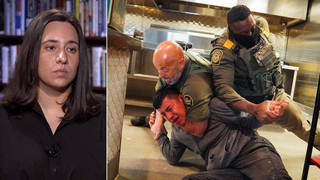
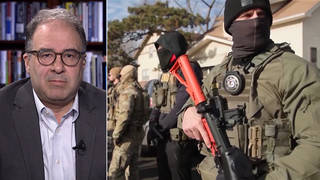
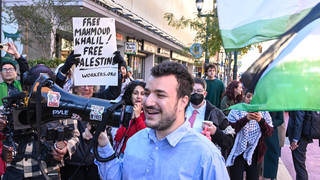


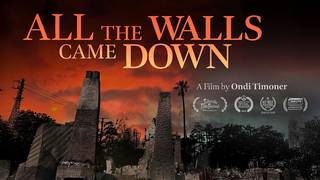
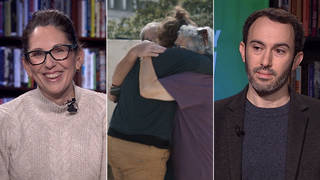

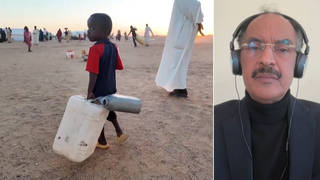

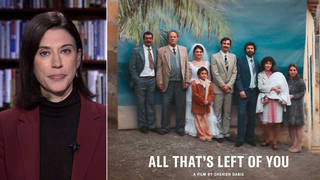
Media Options